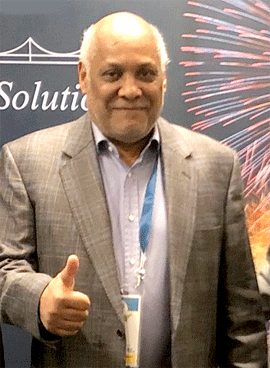 |
 Issa
Baluch may know as much about logistics as anybody you will ever meet. Issa
Baluch may know as much about logistics as anybody you will ever meet.
Issa possesses the chops and know-how gained over
a career that spans 40 years.
Best known as the founder of Dubai-based Swift
Freight, which was a medium sized multi-national that he eventually sold
to Barloworld, one of Issa’s lasting contributions is that he is the
guy that launched sea-air in Dubai.
These days Issa is at Harvard in the USA,
where as a visiting professor he is undoubtedly continuing to think, share
and teach big thoughts about logistics.
While others in the west profess some expertise
on Africa, Issa Baluch who was born in Kenya has spent years developing,
farming and building understanding by breaking down challenges there.
He is Chairman of First Hectares Capital,
an agribusiness and forestry infrastructure investment company for Africa.
Another African venture where Baluch is Chairman is African Agribusiness
Knowledge and Innovation Leadership Initiative (AKILI), hosted at Massachusetts
Institute of Technology’s Center for Advanced Urbanism (MIT-CAU),
the U.S.-based non-profit organization that provides financially, socially
and environmentally sustainable farming in Ghana.
We caught up with Issa on the sidelines of
the recent FIATA World Congress in Cape Town, South Africa as he shared
some further thought.
FT: What is your
take on Africa at the moment?
IB: Africa,
as a continent, is moving in the opposite direction to Brexit. 55 countries
are committed to make the Africa Free Trade Zone (AFTZ) work so they can
achieve the economies of scale to pursue investments, manufacturing on
the basis of freedom of movement of people, goods & currency!
FT: What
are the bright spots?
IB: Several
countries are ahead of others and these include Egypt, South Africa, Kenya,
Uganda, Tanzania, Ethiopia, Rwanda, DRC, Ivory Coast, South Sudan Just
to name a few!
FT: What
are some areas of concern?
IB: The
time table the African leadership have committed themselves to this project
- is it feasible? How fast can the open sky be achieved in real terms?
FT: How
can logistics open some doors?
IB: Logistics
is key and FIATA has been singled out as one that can support this journey!
Without the “wheels of commerce” fully inducted it will be
a challenge. This ties into the liberalization of the open skies policy
in Africa which is within this frame work - how else can they achieve
freedom of movement of people, goods and currency without opening the
skies? Particularly when infrastructure cannot support the planned drive.
FT: Can
you offer a view of Southern Africa?
IB: Southern
African countries are set to take maximum advantage of the AFTZ - this
can be beneficial to them!
FT: How
can the success of a place like Cape Town lift the rest of the continent?
IB: Cape
Town is set to play its role as a regional player.
FT: What
can people interested in growth and the future begin to build in Africa?
IB: At
minimum a sales and contact representation in Africa - then build from
there as things get clarity!
Policies are clear, attracting investments
because the availability of natural resources and the keenness to do business
are there.
FT: We
hear of Rwanda in the same breath as Singapore? Can you comment?
IB: Commitment
to make change is quite visible!
The winds of change are shaping Africa.
We have far too many heroes versus villains, as witnessed in the past.
The young generation 35 and under comprise approximately 70% of the population
so delivering tangible results is a call of the hour!
Traditional Forwarders Playbook
We should make no mistake, if the traditional
forwarder does not embark on innovation, it will be wiped out.
There is a process that demands that everyone
get on board, catch up, and embrace the new thinking of this modern age.
What suffices today is outdated tomorrow.
Those that are content with today’s deliverables are in for a surprise.
The emergence of virtual forwarders is because
the traditional forwarders have left all the windows of innovation wide
open for newcomers to jump in.
So better think of what the customers of
tomorrow want, while keeping innovation and talent development moving
forward on a priority basis.
All effort must be raised toward more investment
and forward-looking activities.
The Human Factor
One final point on this—the best and
worst asset remains the human element.
It is humans that make or break organizations.
I see no change to this narrative.
I recall that the popularized “y2k”
did not stop the world.
Having said this, there is adequate space
for virtual forwarders (VF), but only those that will base their offering
with complementary skills—this will be crucial in the long run.
Geoffrey
|




 Issa
Baluch may know as much about logistics as anybody you will ever meet.
Issa
Baluch may know as much about logistics as anybody you will ever meet. Vol.
18. No. 68
Vol.
18. No. 68